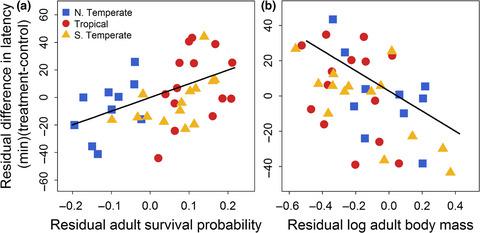当前位置:
X-MOL 学术
›
Ecol. Lett.
›
论文详情
Our official English website, www.x-mol.net, welcomes your
feedback! (Note: you will need to create a separate account there.)
Adult survival probability and body size affect parental risk‐taking across latitudes
Ecology Letters ( IF 7.6 ) Pub Date : 2020-10-07 , DOI: 10.1111/ele.13615 Juan C. Oteyza 1 , James C. Mouton 1 , Thomas E. Martin 2
Ecology Letters ( IF 7.6 ) Pub Date : 2020-10-07 , DOI: 10.1111/ele.13615 Juan C. Oteyza 1 , James C. Mouton 1 , Thomas E. Martin 2
Affiliation

|
Parents faced with a predator must choose between their own safety versus taking care of their offspring. Each choice can have fitness costs. Life‐history theory predicts that longer‐lived species should be less willing than shorter‐lived species to return to care for their offspring after a predator disturbance because they have more opportunities to reproduce in the future. We increased adult predation risk during incubation for 40 bird species in north temperate, tropical, and south temperate latitudes. We found that species with higher adult survival probabilities were more cautious, waiting longer before returning to the nest to provide care. Contrary to other studies, we also found that parents were more risk averse and waited longer to return in smaller than larger species, likely reflecting greater vulnerability of smaller species. Ultimately, the relative risk a predator poses to a species and the probability of future reproduction predict parental risk taking across the world.
中文翻译:

成人生存概率和身材大小影响跨纬度的父母冒险
面对捕食者的父母必须在自身安全与照顾后代之间做出选择。每种选择都会产生健身费用。生命史理论预测,在掠食者干扰后,寿命更长的物种应比寿命短的物种更不愿意为后代提供照料,因为它们将来有更多繁殖的机会。在北温带,热带和南温带纬度孵化40种鸟类时,我们增加了成年捕食的风险。我们发现,成年存活率较高的物种更加谨慎,等待更长的时间才能返回巢穴提供照顾。与其他研究相反,我们还发现,与较大的物种相比,父母更倾向于规避风险,等待更长的时间才能返回较小的物种,这可能反映了较小物种的更大脆弱性。
更新日期:2020-12-12
中文翻译:

成人生存概率和身材大小影响跨纬度的父母冒险
面对捕食者的父母必须在自身安全与照顾后代之间做出选择。每种选择都会产生健身费用。生命史理论预测,在掠食者干扰后,寿命更长的物种应比寿命短的物种更不愿意为后代提供照料,因为它们将来有更多繁殖的机会。在北温带,热带和南温带纬度孵化40种鸟类时,我们增加了成年捕食的风险。我们发现,成年存活率较高的物种更加谨慎,等待更长的时间才能返回巢穴提供照顾。与其他研究相反,我们还发现,与较大的物种相比,父母更倾向于规避风险,等待更长的时间才能返回较小的物种,这可能反映了较小物种的更大脆弱性。











































 京公网安备 11010802027423号
京公网安备 11010802027423号